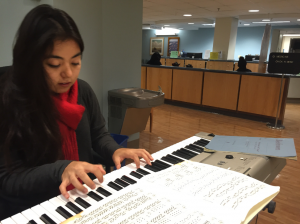Music Study

Originating from the ENGL 695 seminar, the music study was an interdisciplinary investigation into the effect that introducing live musical performances into a waiting room at UNC Memorial Hospital has on people in the waiting room.
This study investigated the effect that introducing live music into a waiting room at UNC Memorial Hospital had on people in the waiting area. While research about music therapy often centers on numbers and anxiety scales, this study attempted to grasp the intangible aspects of the average person’s experience in a waiting room through the use of questionnaires, observation, and verbal feedback. This study explored the effect of live music on all who pass through the waiting room rather than exclusively on the patients in clinics, who are often the subject of studies. By including non-patients in the subject population, this study aimed to acknowledge the caregivers and families of patients as crucial, often-neglected groups in the medical setting and to recognize that the potential benefits of music can influence the care and wellness of caregivers, as well. Furthermore, the project provided further insight into the value of implementing arts and humanities-based approaches in a medical setting.
Two of the co-investigators played classical music and sang in a consenting department’s waiting room at the hospital. One co-investigator took ethnographic observations of the individuals in the waiting room, and all investigators participated in conversations with interested individuals about their experience. Additionally, comment cards/brief questionnaires were used to gather information about peoples’ sensory experience while in the space.
While questionnaires did not yield statistically significant results, observations and verbal interactions with staff members and people in the waiting room suggest that the live music had a positive effect of increasing relaxation and levels of enjoyment in the waiting area. Thus, the preliminary results of the study indicate that incorporating live music into hospital waiting rooms may contribute to a more positive, enjoyable experience for both patrons and staff. Moreover, the methods and smooth execution of the study also demonstrated the feasibility of future projects that might incorporate live music into medical settings.
The research team included Sam Weeks, Nakisa Sadeghi, and Isabel Pinheiro.

